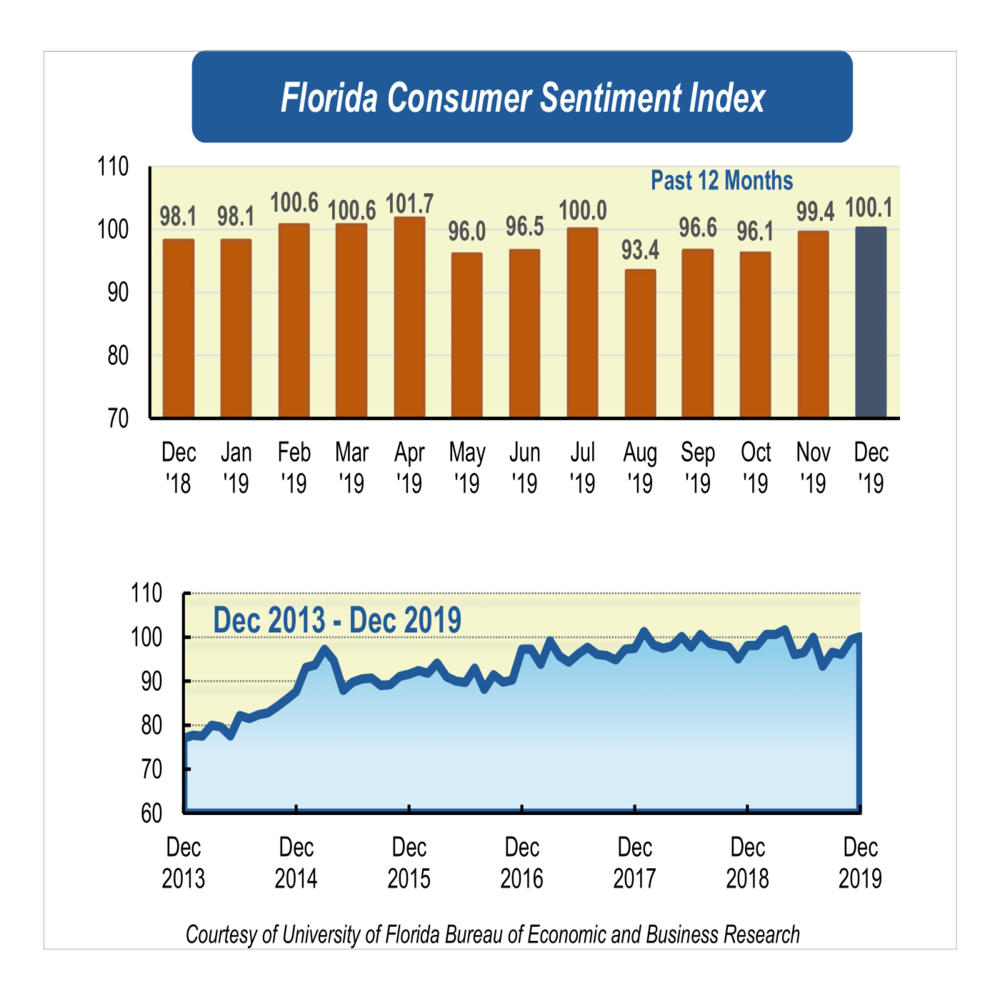
Bump in consumer sentiment heading into the new year
As Florida’s unemployment rate reached a historic low, consumer sentiment among Floridians increased in December by seven-tenths of a point to 100.1 from November’s revised figure of 99.4. Similarly, consumer sentiment at the national level increased in December.
Among the five components that make up the index, three increased and two decreased.
Floridians’ opinions about current economic conditions were mixed. Views of personal financial situations now compared with a year ago decreased 2.1 points from 94.9 to 92.8. However, these views are divided across socio-demographic groups. Men, people younger than 60, and people with annual income under $50,000 expressed less favorable views while women, people 60 and older, people with annual income of $50,000 or more expressed favorable views.
In contrast, opinions as to whether this is a good time to buy a major household item like an appliance increased 3.2 points from 103.3 to 106.5. These upward trends were shared by all Floridians with the exception of those with income levels above $50,000, whose reading showed a negative change.
Similarly, the three components representing future economic conditions were also mixed. Expectations of personal financial situations a year from now dropped 6.4 points, from 108 to 101.6. These pessimistic views are shared by all Floridians. On the contrary, the outlook of U.S. economic conditions over the next year increased 4.3 points from 97.4 to 101.7. Finally, expectations of U.S. economic conditions over the next five years increased 4.6 points from 93.2 to 97.8. Again, these upward readings about the U.S. economic conditions are shared by all Floridians with the exception of those younger than 60 and those with annual income under $50,000.
Florida began 2019 with high levels of consumer confidence. April 2019 reported the highest level in the last 17 years, contributing to an average of 98.9 in the first half of the year. Consumer sentiment dropped significantly in August due to the ongoing trade war with China, and the average consumer sentiment fell to 97.6 in the second half of 2019.
“Notably, the average consumer sentiment in 2019 is one-tenth of a point lower than last year’s average. Despite this slight decline in 2019, overall, consumer sentiment among Floridians remains high,” said Hector H. Sandoval, director of the Economic Analysis Program at UF’s Bureau of Economic and Business Research.
As 2019 ends, economic indicators in Florida have remained very favorable throughout 2019, and the prospects for 2020 are encouraging. The labor market in Florida continued to strengthen in the final months of the year. In November, 217,400 jobs were added statewide compared with a year ago, an increase of 2.5%. Among all industries, education and health services gained the most jobs, followed by leisure and hospitality, and professional and business services. The only industry losing jobs over the year was information. Remarkably, the unemployment rate reached its historic low. The rate was 3.1% in November, down one-tenth of a percentage point from October’s rate.
“The year is ending with an overall positive economic outlook and high level of consumer confidence among Floridians. Looking forward, we expect consumer sentiment to remain high at the beginning of 2020,” Sandoval said.
Conducted Dec. 1-26, the UF study reflects the responses of 397 individuals who were reached on cellphones, representing a demographic cross section of Florida. The index used by UF researchers is benchmarked to 1966, which means a value of 100 represents the same level of confidence for that year. The lowest index possible is a 2, the highest is 150.